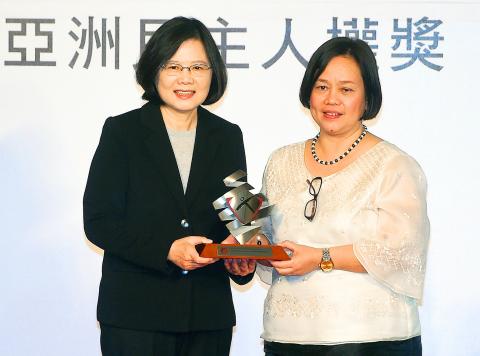President Tsai Ing-wen (蔡英文) yesterday pledged to complete the first-ever official investigative report on the White Terror era within three years, saying that past deeds could be forgiven, but not forgotten.
At an event to mark Human Rights Day at the Jingmei Human Rights Memorial and Cultural Park in New Taipei City, Tsai said the government was looking into “political files” regarding the White Terror era, calling them the “last piece of the puzzle” in the government’s investigative report.
“Going through all the documents is a mammoth task. Many of the political files from 1945 to the 1992 amendment to Article 100 of the Criminal Code are scattered among various government agencies, such as the Military Intelligence Bureau and the Investigation Bureau,” Tsai said.

Photo: Liao Chen-huei, Taipei Times
“Nevertheless, no matter how much dust that has accumulated on top of the files, we will dig out each and every one of them. We will let this part of history see the light of day,” she said.
The president said that the government’s attempt to achieve transitional justice does not target any individual or political party, nor is it aimed at galvanizing political conflict among ethnic groups.
“The experiences of political persecution go beyond ethnic boundaries,” Tsai said.
The White Terror era refers to a period of repression that began after the 228 Incident in 1947, when an anti-government uprising was violently suppressed by the then-Chinese Nationalist Party (KMT) government, which later declared martial law and initiated purges.
Historians estimate that between 10,000 and 30,000 people were killed during the crackdown.
During the event, Tsai also conferred upon the seven children of White Terror era victim Chang Yu-lan (張玉蘭) certificates that symbolically restore their mother’s dignity.
Chang, a deputy stationmaster at the Taiwan Railways Administration’s Pingtung Station, was subjected to severe torture during her 254-day detention after being arrested on suspicion of colluding with communist rebels.
Earlier yesterday, Tsai visited the Taiwan Foundation for Democracy to preside over an award ceremony presenting the Asia Federation Against Involuntary Disappearances with the Asia Democracy and Human Rights Award.
Taiwan is willing to commit to increased dialogue and interactions with the rest of the world on the issues of freedom, democracy and human rights, Tsai said.
The federation’s efforts have been one of the main causes for the UN to adopt the International Convention for the Protection of All Persons from Enforced Disappearances in 2006, and despite limited resources and political pressure, the federation has continued to track and help missing people.
One of the most common reasons for disappearances is political oppression, Tsai said, adding that Taiwan is willing to share its experiences to say thank you for the support and encouragement from the international community during the nation’s struggle for freedom and democracy.
The nation is willing to adopt closer cooperation with the federation, Tsai said, adding that she is looking forward to the foundation’s efforts to spread democracy, freedom and human rights not only to Asia, but also around the world.

Taiwan is projected to lose a working-age population of about 6.67 million people in two waves of retirement in the coming years, as the nation confronts accelerating demographic decline and a shortage of younger workers to take their place, the Ministry of the Interior said. Taiwan experienced its largest baby boom between 1958 and 1966, when the population grew by 3.78 million, followed by a second surge of 2.89 million between 1976 and 1982, ministry data showed. In 2023, the first of those baby boom generations — those born in the late 1950s and early 1960s — began to enter retirement, triggering

ECONOMIC BOOST: Should the more than 23 million people eligible for the NT$10,000 handouts spend them the same way as in 2023, GDP could rise 0.5 percent, an official said Universal cash handouts of NT$10,000 (US$330) are to be disbursed late next month at the earliest — including to permanent residents and foreign residents married to Taiwanese — pending legislative approval, the Ministry of Finance said yesterday. The Executive Yuan yesterday approved the Special Act for Strengthening Economic, Social and National Security Resilience in Response to International Circumstances (因應國際情勢強化經濟社會及民生國安韌性特別條例). The NT$550 billion special budget includes NT$236 billion for the cash handouts, plus an additional NT$20 billion set aside as reserve funds, expected to be used to support industries. Handouts might begin one month after the bill is promulgated and would be completed within

NO CHANGE: The TRA makes clear that the US does not consider the status of Taiwan to have been determined by WWII-era documents, a former AIT deputy director said The American Institute in Taiwan’s (AIT) comments that World War-II era documents do not determine Taiwan’s political status accurately conveyed the US’ stance, the US Department of State said. An AIT spokesperson on Saturday said that a Chinese official mischaracterized World War II-era documents as stating that Taiwan was ceded to the China. The remarks from the US’ de facto embassy in Taiwan drew criticism from the Ma Ying-jeou Foundation, whose director said the comments put Taiwan in danger. The Chinese-language United Daily News yesterday reported that a US State Department spokesperson confirmed the AIT’s position. They added that the US would continue to

IMPORTANT BACKER: China seeks to expel US influence from the Indo-Pacific region and supplant Washington as the global leader, MAC Minister Chiu Chui-cheng said China is preparing for war to seize Taiwan, Mainland Affairs Council (MAC) Minister Chiu Chui-cheng (邱垂正) said in Washington on Friday, warning that Taiwan’s fall would trigger a regional “domino effect” endangering US security. In a speech titled “Maintaining the Peaceful and Stable Status Quo Across the Taiwan Strait is in Line with the Shared Interests of Taiwan and the United States,” Chiu said Taiwan’s strategic importance is “closely tied” to US interests. Geopolitically, Taiwan sits in a “core position” in the first island chain — an arc stretching from Japan, through Taiwan and the Philippines, to Borneo, which is shared by